Cats
Unraveling The Mystery: Why Do Cats Drag Their Butts On The Floor?
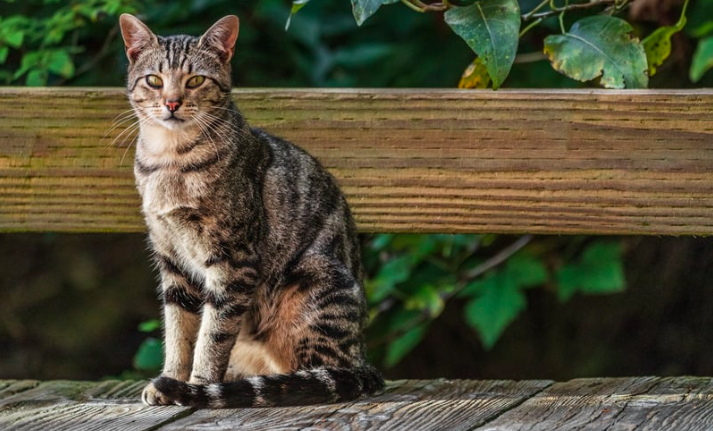
Unraveling the Mystery: Why Do Cats Drag Their Butts On The Floor?
As cat owners, we have all witnessed the peculiar behavior of our feline friends dragging their rear ends across the floor. This act, known as scooting, can be concerning and even embarrassing at times.
In this comprehensive guide, we will delve into the various reasons why cats scoot and explore preventative measures to ensure your furry companion remains happy and healthy.
Reasons for Cats Scooting
Anal Gland Issues
- Impacted Glands: Impacted anal glands occur when the glands fail to empty properly, leading to a buildup of secretions inside. This can cause pain, swelling, and discomfort for your cat, prompting them to scoot to try and express the glands themselves.
- Inflamed Glands: Inflammation of the anal glands can result from various factors, including infections or allergies. Inflamed glands can cause pain and discomfort, leading your cat to scoot in an attempt to alleviate the irritation.
- Abscesses: If an anal gland becomes infected, it may develop into an abscess, which is a painful, pus-filled cavity. Cats with an anal gland abscess may scoot, excessively lick the area, and show signs of pain or discomfort.
Intestinal Parasites
- Tapeworms: Tapeworms are a common intestinal parasite in cats that can cause scooting due to the irritation they create around the anus. Cats can become infected with tapeworms by ingesting infected fleas during grooming or consuming infected rodents.
- Roundworms: Roundworms are another common intestinal parasite that can cause scooting in cats. Cats can become infected with roundworms through contact with contaminated soil, ingestion of infected rodents, or even transmission from their mother during pregnancy or nursing.
Allergies and Skin Irritation
- Food Allergies: Cats can develop food allergies that cause skin irritation and itching around their rear end. In some cases, changing your cat’s diet to hypoallergenic or limited ingredient options may help alleviate these symptoms and reduce scooting behavior.
- Environmental Allergens: Environmental allergens such as pollen, dust mites, and mold can also cause skin irritation and itchiness in cats, leading to scooting. Identifying and minimizing your cat’s exposure to these allergens can help alleviate their discomfort.
- Flea Allergy Dermatitis: Flea allergy dermatitis is a condition where a cat’s skin becomes inflamed and itchy due to an allergic reaction to flea saliva. This can cause severe discomfort, leading your cat to scoot in search of relief. Regular flea prevention is essential in avoiding this issue.
Obesity and Grooming Difficulties
- Limited Mobility: Obese cats may struggle with limited mobility, making it difficult for them to reach and groom their rear end. This lack of grooming can lead to fecal buildup and irritation, prompting the cat to scoot in an attempt to clean the area.
- Matted Fur: Long-haired or obese cats may develop matted fur around their rear end, causing discomfort and irritation. Regular grooming and trimming of the hair in this area can help prevent matting and reduce the likelihood of scooting.
Injuries and Infections
- Trauma: Physical trauma to the area surrounding a cat’s anus, such as a fall or rough play, can cause pain and discomfort, leading to scooting. If you suspect your cat has suffered an injury, consult with your veterinarian for an evaluation and appropriate treatment.
- Perianal Fistulas: Perianal fistulas are painful, ulcerated tracts that can develop around a cat’s anus due to inflammation or infection. These can cause significant pain and discomfort, prompting your cat to scoot. Treatment may include medications, dietary changes, or surgery, depending on the severity of the condition.
How to Prevent Cats Scooting
Regular Vet Checkups
- Preventative Care: Establishing a consistent preventative care routine with your veterinarian can help identify potential scooting causes early on. This includes vaccinations, parasite prevention, and routine examinations to ensure your cat’s overall health and well-being.
- Dental Care: Good dental hygiene plays a significant role in your cat’s overall health. Regular dental checkups and cleanings can help prevent oral infections and inflammation, which may contribute to scooting behavior in some cases.
Proper Grooming and Hygiene
- Regular Brushing: Brushing your cat’s coat regularly can help remove loose hair and dander, reducing the risk of matting and skin irritation that may lead to scooting. Choose a brush appropriate for your cat’s fur type and establish a routine grooming schedule.
- Bathing: Occasional bathing can help keep your cat’s coat and skin clean and free of irritants. Use a gentle, cat-specific shampoo and be mindful of the water temperature to ensure a comfortable and stress-free experience for your feline friend.
Maintaining a Healthy Weight
- Balanced Diet: Feeding your cat a balanced and species-appropriate diet is essential in maintaining a healthy weight. Consult with your veterinarian to determine the best food options and portion sizes for your cat’s specific needs.
- Exercise and Enrichment: Providing your cat with opportunities for exercise and mental stimulation can help prevent obesity and the associated grooming difficulties that may lead to scooting. Interactive toys, climbing structures, and regular play sessions can keep your cat active and engaged.
Monitoring for Allergies and Skin Irritations
- Elimination Diets: If you suspect your cat has a food allergy, consult with your veterinarian about conducting an elimination diet. This process involves removing potential allergens from your cat’s diet and reintroducing them one by one to identify the culprit.
- Controlling Environmental Allergens: Regular cleaning and air filtration can help reduce allergens in your home, minimizing your cat’s exposure and potential skin irritations. Vacuuming, dusting, and using HEPA air purifiers can help create a cleaner environment for your cat.
Treating Parasites
- Monthly Flea and Tick Preventatives: Administering monthly flea and tick preventatives is essential in protecting your cat from the discomfort and potential health issues associated with these parasites. Consult with your veterinarian to determine the best preventative options for your cat.
- Deworming Treatments: Regular deworming treatments can help protect your cat from intestinal parasites that may cause scooting. Depending on your cat’s lifestyle and risk factors, your veterinarian may recommend specific deworming schedules and treatments to keep your cat parasite-free.
Conclusion
In conclusion, there are several potential reasons why a cat may drag its butt on the floor, ranging from anal gland issues to obesity.
By scheduling regular vet checkups, maintaining proper grooming and hygiene, helping your cat maintain a healthy weight, monitoring for allergies and skin irritations, and treating parasites, you can ensure your feline friend remains healthy and scoot-free.
Questions People Also Ask: (FAQs)
How can I tell if my cat has an anal gland issue?
Some common signs of anal gland issues in cats include scooting, excessive licking or biting of the rear end, swelling or redness around the anus, and a foul smell coming from the area. If you suspect your cat has an anal gland issue, consult with your veterinarian for further evaluation and treatment.
Can scooting cause harm to my cat?
While scooting itself is unlikely to cause harm, the underlying issues causing the behavior may lead to more severe problems if left untreated. It’s essential to address any potential causes of scooting and seek veterinary care if necessary.
How often should I bring my cat to the vet for checkups?
It’s generally recommended to bring your cat to the vet for routine checkups at least once a year. However, kittens, senior cats, and those with chronic health issues may require more frequent visits. Consult with your veterinarian to determine the appropriate checkup schedule for your cat.
Can I express my cat’s anal glands at home?
While some pet owners may attempt to express their cat’s anal glands at home, it’s generally best to leave this task to a professional. Incorrectly expressing the glands can cause further irritation or injury.
What should I do if I see worms in my cat’s feces?
If you notice worms in your cat’s feces, it’s crucial to consult with your veterinarian as soon as possible. They can help identify the type of parasite and recommend the appropriate deworming treatment to eliminate the infestation and prevent further health issues.
How can I prevent my cat from becoming overweight?
Preventing your cat from becoming overweight involves providing a balanced diet, portion control, and ensuring they get regular exercise.
Consult with your veterinarian to determine the appropriate type and amount of food for your cat’s specific needs and lifestyle. Additionally, engaging your cat in interactive play sessions can help them stay active and maintain a healthy weight.
What if my cat continues to scoot even after treatment?
If your cat continues to scoot after receiving treatment for the underlying issue, it’s essential to consult with your veterinarian again.
They may need to reevaluate your cat’s condition, adjust the treatment plan, or investigate other potential causes of the scooting behavior. Persistence and open communication with your veterinarian will help ensure your cat’s health and well-being.
We appreciate you for taking the time to read this article!
Finally, we hope you found this article interesting? And what do you think about ”Unraveling The Mystery: Why Do Cats Drag Their Butts On The Floor?!?”
Please feel free to share or inform your friends about this article and this site, thanks!
And let us know if you observe something that isn’t quite right.
Cats
Clever Cats: Breeds That Learn Fast

Clever Cats: Breeds That Learn Fast
Cats have always fascinated us with their agility, independence, and sometimes enigmatic behavior. Among the vast array of feline breeds, some stand out for their remarkable intelligence and ability to learn quickly.
In this article, we will delve into the world of these exceptional cat breeds, exploring their unique characteristics, training capabilities, and what makes them such quick learners.
Whether you’re a seasoned cat owner or considering adopting a new feline friend, this comprehensive guide will help you understand the breeds that are not only intelligent but also a joy to train.
Why Intelligence Matters in Cats
Understanding Feline Intelligence
Feline intelligence is a multi-faceted trait that encompasses problem-solving abilities, social learning, and adaptability. Unlike dogs, cats often showcase their intelligence in more subtle ways, such as manipulating objects to get what they want or learning routines and commands.
Benefits of Owning Intelligent Cats
Owning an intelligent cat comes with several benefits. These cats are more interactive and engaging, making them excellent companions. They can learn tricks, follow commands, and even understand basic household rules, which makes living with them more enjoyable and less challenging.
Top Cat Breeds Known for Their Intelligence
Abyssinian
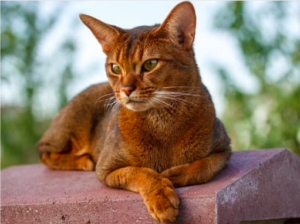
Overview
The Abyssinian is often hailed as one of the smartest cat breeds. Known for their curiosity and playful nature, Abyssinians are quick learners who thrive on mental stimulation.
Training and Activities
Abyssinians are highly trainable and enjoy interactive toys and puzzle feeders. They can learn tricks such as fetching and even walking on a leash. Their love for heights means they appreciate cat trees and climbing structures.
Siamese
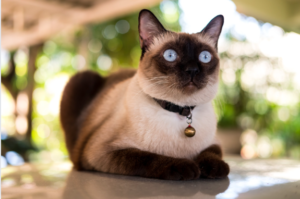
Overview
Siamese cats are not only intelligent but also highly vocal and sociable. They form strong bonds with their owners and are always eager to engage in activities.
Training and Activities
Siamese cats are quick to learn tricks and commands. They enjoy interactive play and can be trained to perform simple tasks like opening doors or retrieving items. Their vocal nature also makes them responsive to verbal cues.
Bengal
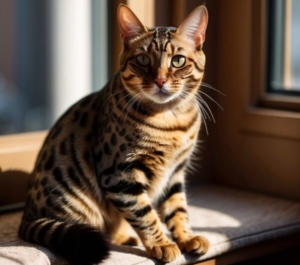
Overview
Bengals are known for their striking appearance and high energy levels. Their intelligence is reflected in their ability to solve problems and learn complex tasks.
Training and Activities
Bengals enjoy activities that challenge their minds, such as agility courses and puzzle toys. They can be trained to walk on a leash and perform tricks. Providing them with interactive playtime helps in channeling their energy positively.
Burmese
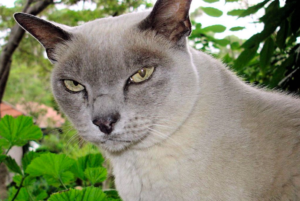
Overview
Burmese cats are affectionate, people-oriented, and intelligent. They enjoy being involved in family activities and can be trained to follow various commands.
Training and Activities
Burmese cats are quick learners and respond well to positive reinforcement. They enjoy learning tricks, playing fetch, and interactive games that stimulate their minds.
Scottish Fold

Overview
Scottish Folds are known for their distinctive folded ears and sweet demeanor. Despite their calm appearance, they are intelligent and can learn quickly.
Training and Activities
Scottish Folds enjoy interactive toys and games. They can learn tricks and commands and appreciate routines that keep their minds engaged.
Training Tips for Intelligent Cats
Start Early
Begin training your cat as early as possible. Kittens are more receptive to learning new behaviors and routines.
Use Positive Reinforcement
Reward your cat with treats, praise, or playtime whenever they successfully perform a desired behavior. Positive reinforcement strengthens the association between the action and the reward.
Keep Sessions Short and Fun
Cats have shorter attention spans than dogs, so keep training sessions brief and enjoyable. Incorporate playtime to make learning fun for your cat.
Be Patient and Consistent
Patience and consistency are key when training cats. Repeat commands and routines regularly, and avoid punishing your cat for mistakes. Consistency helps reinforce learning and builds trust.
Challenges of Training Intelligent Cats
Independence and Stubbornness
Intelligent cats can sometimes be independent and stubborn. They might choose to ignore commands if they are not in the mood, so it’s important to understand their behavior and work with it.
Need for Mental Stimulation
Highly intelligent cats require constant mental stimulation. Boredom can lead to behavioral issues, so ensure they have plenty of toys, activities, and interaction to keep their minds engaged.
Managing High Energy Levels
Breeds like Bengals have high energy levels that need to be managed. Providing them with enough physical and mental exercise is crucial to prevent destructive behavior.
Living with Intelligent Cats
Creating an Enriched Environment
An enriched environment is essential for intelligent cats. This includes a variety of toys, climbing structures, scratching posts, and interactive feeders to keep them stimulated.
Social Interaction
Intelligent cats thrive on social interaction. Spend quality time playing, training, and simply bonding with your cat to ensure they feel valued and engaged.
Understanding Their Needs
Each intelligent breed has its own unique needs and preferences. Understanding these and catering to them will help you build a strong and positive relationship with your cat.
Conclusion
Owning an intelligent cat can be an incredibly rewarding experience. These quick learners bring joy, challenge, and companionship to their owners. By understanding their unique characteristics and providing the right environment and training, you can foster a deep and fulfilling relationship with your feline friend.
Whether you choose an Abyssinian, Siamese, Bengal, Burmese, or Scottish Fold, you’re sure to enjoy the remarkable intelligence and personality they bring into your home.
Frequently Asked Questions (FAQs)
What makes a cat breed intelligent?
Intelligent cat breeds often show high levels of problem-solving abilities, adaptability, and social learning. They can quickly learn commands, tricks, and routines.
Can all cats be trained?
While some breeds are more receptive to training than others, all cats can be trained to some extent. Patience, consistency, and positive reinforcement are key to successful training.
What are the best toys for intelligent cats?
Interactive toys, puzzle feeders, and climbing structures are ideal for intelligent cats. These toys provide mental stimulation and keep them engaged.
How do I keep my intelligent cat from getting bored?
Provide a variety of toys, engage in regular playtime, and introduce new activities regularly. Rotating toys and creating an enriched environment also help prevent boredom.
Are intelligent cats more difficult to care for?
Intelligent cats can be more demanding in terms of mental stimulation and interaction. However, with the right approach and environment, they can be delightful companions.
We appreciate you for taking the time to read this article!
Finally, we hope you found this article interesting? And what do you think about ”Clever Cats: Breeds That Learn Fast!?”
Please feel free to share or inform your friends about this article and this site, thanks!
And let us know if you observe something that isn’t quite right.
Cats
The Enchanting Scottish Fold: A Guide to the Adorable Feline with Folded Ears
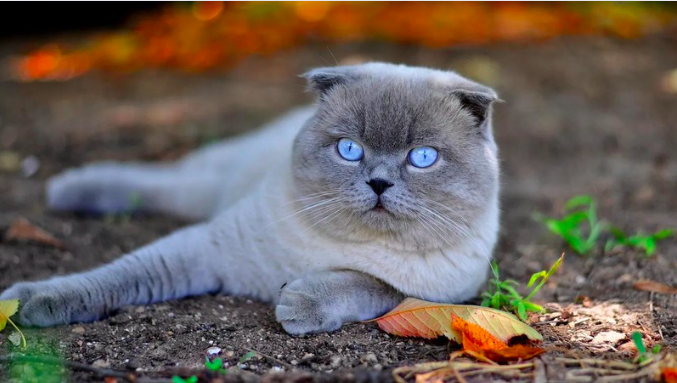
The Enchanting Scottish Fold: A Guide to the Adorable Feline with Folded Ears
Welcome to the world of the Scottish Fold cat, where charm and curiosity meet in an irresistibly adorable package. With their distinctive folded ears and sweet expression, Scottish Folds have captured the hearts of cat lovers around the world. Originally hailing from Scotland, these cats are known for their gentle demeanor, playful nature, and loving personality.
In this comprehensive guide, we will delve into the fascinating world of Scottish Fold cats, exploring their history, physical characteristics, personality traits, and care requirements. Whether you’re a seasoned cat owner or considering adding a feline friend to your family, the Scottish Fold’s unique charm and affectionate nature make them a delightful addition to any home. Join us as we unravel the enchanting tale of the Scottish Fold cat and discover why they are such beloved companions.
Fold
Overview
The Scottish Fold cat is a charming and distinctive breed known for its unique folded ears and sweet expression. Originating from Scotland in the 1960s, these cats have captured the hearts of many with their endearing appearance and affectionate nature. Scottish Folds are known for their gentle and loving temperament, making them wonderful companions for families and individuals alike.
History and Origins
The Scottish Fold breed traces its roots back to a white barn cat named Susie, who was found in Scotland in the early 1960s. Susie had a unique genetic mutation that caused her ears to fold forward, giving her an owl-like appearance. This trait was passed down to her kittens, and thus, the Scottish Fold breed was born. The breed quickly gained popularity for its distinctive look and friendly demeanor, and it was officially recognized by cat registries in the 1970s.
Physical Characteristics
- Folded Ears: The most distinctive feature of the Scottish Fold is its folded ears, which give the cat a sweet and owl-like appearance. Not all Scottish Folds have folded ears; some may have straight ears, known as “straights,” which are also common in the breed.
- Coat and Colors: Scottish Folds can have either a short or long coat, both of which are dense and plush. They come in a variety of colors and patterns, including tabby, tortoiseshell, and solid colors like white, black, and blue.
- Body Structure: Scottish Folds are medium-sized cats with a rounded appearance. They have sturdy bodies, round faces, and large, expressive eyes that give them a sweet and gentle expression.
Personality and Behavior
Scottish Folds are known for their calm and laid-back demeanor. They are affectionate cats that enjoy being around people and are often described as “lap cats” due to their love of cuddling. They are also known for their playful nature and enjoy interactive toys and games. Scottish Folds are generally good with children and other pets, making them a great choice for families.

Health and Care
- Ear Care: Due to their folded ears, Scottish Folds may be prone to ear infections. It’s important to regularly check and clean their ears to prevent issues.
- Grooming: Scottish Folds have dense coats that require regular grooming to prevent matting and tangling. Weekly brushing is usually sufficient to keep their coat in good condition.
- Health Concerns: Scottish Folds are generally healthy, but they may be prone to certain genetic conditions, including a skeletal disorder known as osteochondrodysplasia. Responsible breeding practices can help minimize the risk of these health issues.
Training and Activities
Scottish Folds are intelligent cats that can be trained to perform tricks and commands. They enjoy interactive play and benefit from toys that stimulate their minds and bodies. Providing them with scratching posts and other outlets for their natural behaviors can help keep them happy and healthy.
Compatibility with Families and Other Pets
Scottish Folds are known for their gentle and affectionate nature, making them great companions for families. They are good with children and other pets, including dogs, and can adapt well to different environments. Their loving and sociable nature makes them a popular choice for households looking for a friendly and affectionate pet.
Conclusion
The Scottish Fold cat is a unique and charming breed known for its folded ears and sweet expression. With their gentle demeanor and affectionate nature, Scottish Folds make wonderful companions for families and individuals alike. Whether you’re looking for a lap cat to cuddle with or a playful friend to keep you entertained, the Scottish Fold cat is sure to bring joy and companionship to your home.
FAQs about Scottish Fold Cats
Why do Scottish Folds have folded ears?
Scottish Folds have a genetic mutation that affects the cartilage in their ears, causing them to fold forward. This unique trait gives them their distinctive appearance.
Are Scottish Folds prone to ear problems due to their folded ears?
Yes, Scottish Folds may be more prone to ear infections due to the fold in their ears, which can trap dirt and moisture. Regular cleaning and monitoring of their ears can help prevent issues.
Do Scottish Folds have any health issues associated with their folded ears?
Scottish Folds may be prone to a condition called osteochondrodysplasia, which affects the development of their cartilage and bones. Responsible breeding practices can help reduce the risk of this condition.
Are Scottish Folds good with children and other pets?
Scottish Folds are known for their gentle and friendly nature, making them good companions for families with children and other pets. They enjoy socializing and being part of the family.
Do Scottish Folds require a lot of grooming?
Scottish Folds have dense coats that require regular grooming to prevent matting and tangles. Weekly brushing is recommended to keep their coat in good condition.
We appreciate you for taking the time to read this article!
Finally, we hope you found this article interesting? And what do you think about ”The Enchanting Scottish Fold: A Guide to the Adorable Feline with Folded Ears!?”
Please feel free to share or inform your friends about this article and this site, thanks!
And let us know if you observe something that isn’t quite right.
Cats
The Enchanting Burmese Cat: Affectionate, Playful, and Loyal
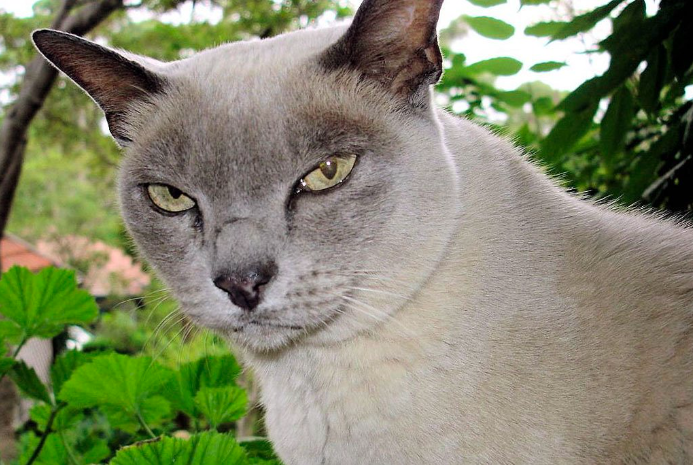
The Enchanting Burmese Cat: Affectionate, Playful, and Loyal
Enter the world of the Burmese cat, where elegance meets affection in a charming feline companion. Originating from the temples of Burma, these cats have captured the hearts of cat lovers worldwide with their striking appearance and loving nature. With their sleek coats, expressive eyes, and playful demeanor, Burmese cats are not just pets; they are cherished members of the family.
In this comprehensive guide, we delve into the captivating world of Burmese cats, exploring their history, physical characteristics, personality traits, and care requirements. Whether you’re a seasoned cat owner or considering adding a feline friend to your family, the Burmese cat’s unique blend of beauty, intelligence, and affection is sure to captivate you. Join us as we unravel the enchanting tale of the Burmese cat and discover why they are such beloved companions.
Burmese
Overview
The Burmese cat is a breed known for its striking appearance and affectionate nature. Originating from Burma (now Myanmar), these cats are renowned for their sleek, muscular bodies, expressive eyes, and silky coats. Burmese cats are often described as “people-oriented,” as they form strong bonds with their human companions and enjoy being part of the family. Their playful and curious nature makes them delightful companions for both children and adults alike.
History and Origins
The history of the Burmese cat can be traced back to ancient Burma, where they were considered sacred and kept by monks in temples. They were later brought to the West in the early 20th century and quickly gained popularity for their striking appearance and affectionate personality. The breed has since become a favorite among cat enthusiasts worldwide, known for its loving and loyal nature.
Physical Characteristics
- Coat and Colors: Burmese cats have short, sleek coats that lie close to the body. They come in a variety of colors, including sable, champagne, blue, and platinum. The coat is soft and silky to the touch, adding to the breed’s overall charm.
- Body Structure: Burmese cats are medium-sized with a muscular build. They have rounded heads, large, expressive eyes, and short, straight noses. Their compact bodies give them a sturdy appearance, and they move with grace and agility.
- Eyes and Ears: Their eyes are one of their most striking features, being large, expressive, and usually a deep, rich color that complements their coat. Their ears are medium-sized, slightly rounded at the tips, and set wide apart on the head.
Personality and Behavior
Burmese cats are known for their affectionate and sociable nature. They are often described as “dog-like” due to their tendency to follow their owners around the house and seek out human companionship. They are also highly intelligent and enjoy interactive play, making them great companions for families with children or other pets.
In addition to their affectionate nature, Burmese cats are also known for their vocalizations. They have a soft, sweet voice that they use to communicate with their owners, often engaging in “conversations” and expressing their needs and desires.
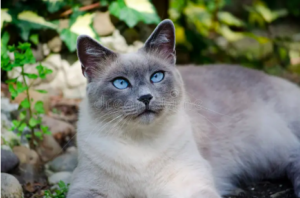
Health and Care
- Grooming: Burmese cats have short coats that require minimal grooming. Weekly brushing is usually sufficient to remove loose hair and keep their coat shiny. They also benefit from regular dental care to prevent oral health issues.
- Diet: A high-quality, balanced diet is essential for maintaining the health and vitality of Burmese cats. They should be fed a diet that is appropriate for their age, size, and activity level to ensure they receive the nutrients they need.
- Health Concerns: Burmese cats are generally healthy, but they can be prone to certain genetic conditions such as hypertrophic cardiomyopathy (HCM) and diabetes. Regular veterinary check-ups and a healthy diet can help manage these risks.
Training and Activities
Burmese cats are intelligent and can be trained to perform various tricks and commands. They enjoy interactive play and thrive on mental stimulation. Providing them with toys, puzzle feeders, and opportunities for play can help keep them entertained and prevent boredom.
Compatibility with Families and Other Pets
Burmese cats are known for their loving and social nature, making them great companions for families. They get along well with children and other pets, including dogs, as long as they are properly introduced. Their affectionate demeanor and playful nature make them a popular choice for households looking for a friendly and engaging pet.
Conclusion
The Burmese cat is a breed beloved for its affectionate nature, striking appearance, and playful personality. Whether you are looking for a loyal companion or a playful friend, the Burmese cat is sure to bring joy and warmth to your home. With their loving nature and sociable demeanor, Burmese cats make wonderful pets for families and individuals alike, enriching their lives with their presence and affection.
FAQs about Burmese Cats
What is the temperament of a Burmese cat like?
Burmese cats are known for their affectionate and social nature. They are often described as “dog-like” due to their loyalty and tendency to follow their owners around the house. They enjoy being involved in family activities and form strong bonds with their human companions.
Are Burmese cats good with children and other pets?
Yes, Burmese cats are generally good with children and other pets. They are playful and enjoy interactive play, making them great companions for families with children. They also get along well with other pets, including dogs, especially if they are introduced properly.
Do Burmese cats require a lot of grooming?
Burmese cats have short, sleek coats that require minimal grooming. Weekly brushing is usually sufficient to remove loose hair and keep their coat shiny. They also benefit from regular dental care to prevent oral health issues.
Are Burmese cats vocal?
Burmese cats are known for their soft, sweet voice, but they are not excessively vocal. They use their voice to communicate with their owners, often engaging in “conversations” and expressing their needs and desires.
What kind of environment is best for a Burmese cat?
Burmese cats thrive in environments where they have plenty of opportunities for play and interaction. They enjoy being part of the family and should have access to toys, scratching posts, and other enrichment activities. They also enjoy having access to outdoor enclosures or safe outdoor spaces where they can explore and indulge their natural instincts.
We appreciate you for taking the time to read this article!
Finally, we hope you found this article interesting? And what do you think about ”The Enchanting Burmese Cat: Affectionate, Playful, and Loyal!?”
Please feel free to share or inform your friends about this article and this site, thanks!
And let us know if you observe something that isn’t quite right.
-

 Pet Care2 years ago
Pet Care2 years agoThe Best Dog Collars For 2022
-

 Dogs2 years ago
Dogs2 years agoBichon Frise: The Happy, Playful, and Cuddly Companion
-

 Trending Pet Stories1 year ago
Trending Pet Stories1 year ago2023 ‘World’s Ugliest Dog’ Winner: Scooter’s Tale of Resilience
-

 Animals2 years ago
Animals2 years agoAre There Animals Having Down Syndrome?
-

 Pets2 years ago
Pets2 years agoThe Fascinating World Of The Red Chameleon
-

 Dogs2 years ago
Dogs2 years agoTop 10 Most Popular Dog Breeds According To AKC.
-

 Dogs2 years ago
Dogs2 years ago21 Dog Breeds That Resemble Bears Or Teddy Bears!
-

 Dogs2 years ago
Dogs2 years agoEskimo Dogs from Canada – What Are They? – Find Out!







